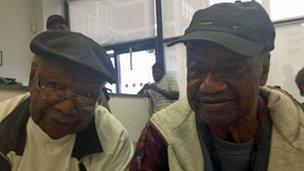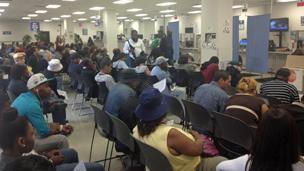Voter ID laws: Will new rules keep voters from the polls?
- Published

Elbert and Albert Green waited to update their IDs
Fourteen US states have introduced voter ID laws designed to prevent fraud in November's elections. In Pennsylvania, critics claim the restrictions will keep people from the polls, especially poor and minority voters.
The woman filling out forms at a driving licence office in Philadelphia has such poor vision that she had to hold the clipboard an inch from her face to sign her name.
Luckily, Helen Gray is not here to get permission to drive.
"God help us all if she gets on the road," says Gretta Harris, who accompanied her.
A new state law passed this spring requires voters to show a photo ID at the polling station before they can cast a ballot. Gray is here to get one so she can vote in November's presidential election.
Though about 60% of Pennsylvanians approve of the law, it has drawn the ire of voting rights activists and election observers.
They worry the law places an undue burden on people trying to exercise a constitutional right. And they fear the relatively short time between the law's passage and the election leaves thousands of voters at risk of being disenfranchised.
"This law was implemented way too quickly," says Zack Stalberg, CEO of the Committee of Seventy, a Philadelphia non-partisan group that says it works for effective, efficient government.
"The rules are fuzzy."
For most Americans, photo ID is a part of everyday life. One is needed to enter bars, buy cold/flu medicine, board an airplane, and more.
Yet as many as 11% of American adults go through their daily lives without one, according to the Brennan Center at New York University.
"Increasingly, people are able to operate without IDs and be productive members of society," says Keesha Gaskins, senior counsel in the Brennan Center's Democracy Program.
Gray has an old driving licence, long expired. With no intention of getting on the road, she saw no reason to renew it - until now.
So she and Harris spent two hours one morning waiting on the plastic chairs at the motor vehicle office.
Poorer Americans living paycheck to paycheck find it difficult to get the time off from work to spend hours waiting to see a clerk, says Gaskins.
"Often it takes four, five, six hours, or one or two trips," she says.
About 500,000 Americans live more than 10 miles from the nearest ID centre but do not own cars, Gaskins says. And many facilities keep an 09:00-17:00 schedule without weekend hours.
"You've got all these situations that pile on top of each other that can make it really difficult for someone who is working hard, trying to provide for their family, to take time off to get an ID," she says.
The Committee of Seventy and others brought a lawsuit challenging the law. It is currently making its way through the state court system.
This week a judge will decide whether or not to delay the law from taking effect until after the election.
While the high court ruled the state has the right to regulate elections, the plaintiffs asked a lower court to determine if the law's speedy implementation leaves too many people unable to cast a vote.
Since the court challenge, the state has made it easier for voters to get the necessary ID.
Voters who were born in Pennsylvania no longer need to provide an original copy of a birth certificate. Registered voters can also obtain an ID that can be used to vote but not to board an airplane or buy alcohol.

It can be difficult for low-income workers to take time off to wait for the clerk
And some counties are preparing to issue their own IDs at senior care facilities.
"State agencies have really been working together to make this a smooth process," says Matthew Keeler, spokesman for Pennsylvania's Department of State.
At the Philadelphia motor vehicle office facility, Albert and Elbert Green, retired twin brothers from West Philadelphia, have been waiting three hours to update their IDs.
"We use ID for everything, not just for voting," said Elbert Green. "Cashing checks, identification."
They learned about the law from their senior centre and had easy access to the voter centre from public transportation.
To the law's supporters, cases like that of the Green brothers show it is not overly burdensome to get an ID, and that if voting is important enough, a voter should take the time to comply with the new law.
But that, says Gaskins, is not the point.
"Voting is a constitutional right," she says.
"Should we require ID from people who don't have it in order for them to exercise a fundamental constitutional right?"